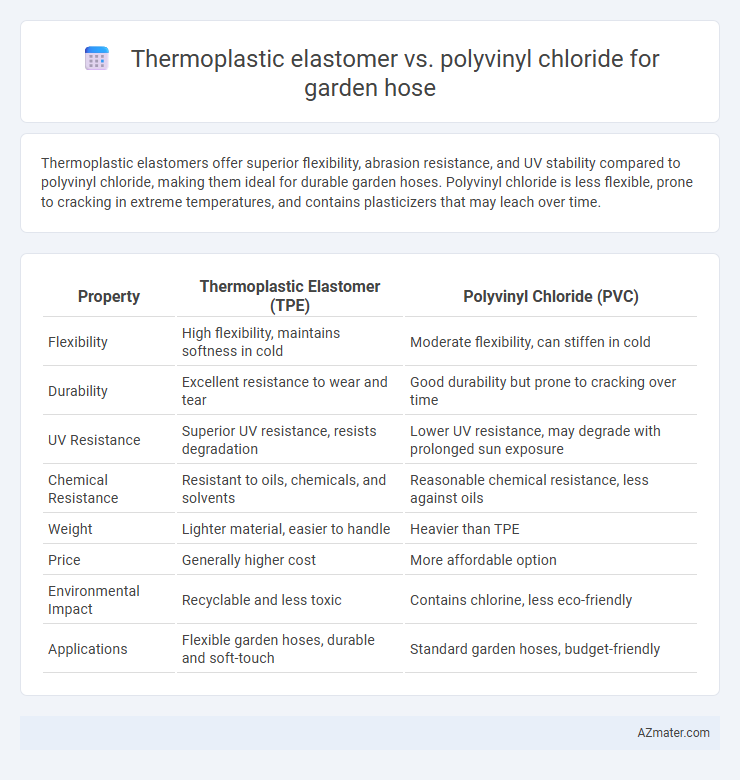Thermoplastic elastomers offer superior flexibility, abrasion resistance, and UV stability compared to polyvinyl chloride, making them ideal for durable garden hoses. Polyvinyl chloride is less flexible, prone to cracking in extreme temperatures, and contains plasticizers that may leach over time.
Table of Comparison
| Property | Thermoplastic Elastomer (TPE) | Polyvinyl Chloride (PVC) |
|---|---|---|
| Flexibility | High flexibility, maintains softness in cold | Moderate flexibility, can stiffen in cold |
| Durability | Excellent resistance to wear and tear | Good durability but prone to cracking over time |
| UV Resistance | Superior UV resistance, resists degradation | Lower UV resistance, may degrade with prolonged sun exposure |
| Chemical Resistance | Resistant to oils, chemicals, and solvents | Reasonable chemical resistance, less against oils |
| Weight | Lighter material, easier to handle | Heavier than TPE |
| Price | Generally higher cost | More affordable option |
| Environmental Impact | Recyclable and less toxic | Contains chlorine, less eco-friendly |
| Applications | Flexible garden hoses, durable and soft-touch | Standard garden hoses, budget-friendly |
Introduction to Garden Hose Materials
Thermoplastic elastomers (TPE) and polyvinyl chloride (PVC) are two common materials used in garden hose manufacturing, each offering distinct advantages. TPE provides superior flexibility, durability, and resistance to weathering, making it ideal for frequent outdoor use and varying temperatures. PVC, on the other hand, is more cost-effective and resistant to chemicals but tends to be less flexible and more prone to cracking under extreme cold conditions.
Understanding Thermoplastic Elastomer (TPE)
Thermoplastic elastomer (TPE) offers superior flexibility, durability, and resistance to UV radiation and abrasion compared to polyvinyl chloride (PVC) in garden hose applications. TPE's unique composition combines the elasticity of rubber with the processability of plastics, enabling enhanced kink resistance and longer service life. This makes TPE a preferred material for garden hoses requiring comfort, environmental resilience, and reduced chemical leaching.
What is Polyvinyl Chloride (PVC)?
Polyvinyl chloride (PVC) is a widely used synthetic plastic polymer known for its durability, chemical resistance, and cost-effectiveness in manufacturing garden hoses. PVC provides excellent flexibility and weather resistance, making it suitable for outdoor use, but it may become brittle over time when exposed to extreme temperatures or UV radiation. Compared to thermoplastic elastomers, PVC hoses are generally less elastic but offer superior rigidity and affordability for standard gardening applications.
Flexibility and Handling: TPE vs PVC
Thermoplastic elastomers (TPE) offer superior flexibility and softer handling compared to polyvinyl chloride (PVC) in garden hoses, enhancing user comfort during extended use. TPE hoses maintain elasticity across a wider temperature range, reducing kinks and improving maneuverability in various weather conditions. PVC hoses, while durable, tend to be stiffer and less flexible, which can lead to increased hand fatigue and reduced ease of use.
Durability and Weather Resistance Compared
Thermoplastic elastomers (TPE) offer superior durability compared to polyvinyl chloride (PVC) for garden hoses due to their excellent flexibility and resistance to cracking under stress. TPE materials exhibit enhanced weather resistance, maintaining elasticity and structural integrity when exposed to UV radiation, temperature fluctuations, and moisture over extended periods. In contrast, PVC tends to become brittle and degrades faster in harsh outdoor conditions, making TPE a more reliable choice for long-lasting garden hoses.
Environmental Impact and Recyclability
Thermoplastic elastomers (TPE) offer significant environmental advantages over polyvinyl chloride (PVC) in garden hose applications due to their improved recyclability and lower toxic chemical content. TPEs can be easily reprocessed and reused, reducing plastic waste and minimizing landfill impact, whereas PVC often contains harmful additives like phthalates and chlorine that complicate recycling and increase environmental toxicity. Choosing TPE for garden hoses supports sustainable manufacturing practices by enabling better material recovery and lowering the overall ecological footprint of garden watering products.
Health and Safety: BPA and Phthalates
Thermoplastic elastomers (TPEs) used in garden hoses typically contain no BPA or phthalates, making them safer for health and environmental exposure compared to polyvinyl chloride (PVC). PVC hoses often require phthalates as plasticizers, which can leach harmful chemicals, posing risks of endocrine disruption and toxicity. Choosing TPE garden hoses minimizes exposure to these hazardous substances, ensuring safer water delivery for gardening or drinking purposes.
Cost Comparison and Value for Money
Thermoplastic elastomers (TPE) typically cost more upfront than polyvinyl chloride (PVC) for garden hoses but offer superior flexibility, durability, and resistance to UV and chemicals, enhancing long-term value. PVC hoses are more budget-friendly initially but may degrade faster, requiring frequent replacements that increase overall expenses. Evaluating cost per lifespan shows TPE hoses provide better value for money through reduced maintenance and longer service life.
User Experience and Performance Reviews
Thermoplastic elastomer (TPE) garden hoses offer superior flexibility, resistance to kinking, and durability, resulting in a smoother user experience compared to polyvinyl chloride (PVC) hoses, which are often stiffer and prone to cracking over time. User reviews highlight TPE hoses for their lightweight design and excellent weather resistance, making them ideal for extended outdoor use, while PVC hoses commonly receive feedback citing stiffness and reduced lifespan under harsh conditions. Performance tests indicate TPE maintains elasticity and functional integrity across temperature variations, whereas PVC tends to become brittle, affecting hose longevity and ease of use.
Conclusion: Choosing the Best Material for Garden Hoses
Thermoplastic elastomer (TPE) offers superior flexibility, UV resistance, and environmental friendliness compared to polyvinyl chloride (PVC), which is more rigid and less durable under prolonged sun exposure. TPE hoses provide enhanced durability and a comfortable grip, making them ideal for frequent garden use, while PVC hoses are cost-effective for occasional watering needs. Selecting TPE ensures long-term performance and sustainability, making it the best material choice for garden hoses.

Infographic: Thermoplastic elastomer vs Polyvinyl chloride for Garden hose
 azmater.com
azmater.com